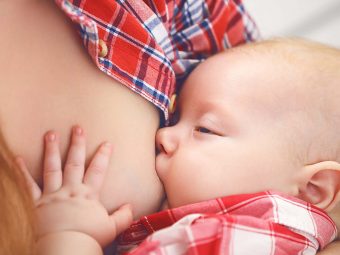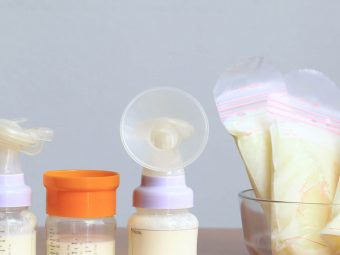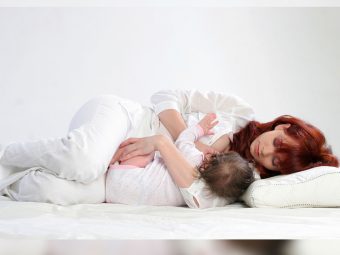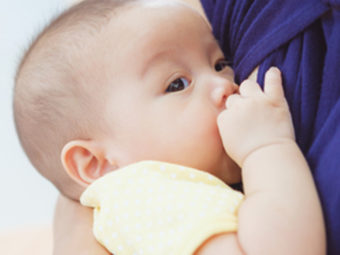
Image: ShutterStock
Breastfeeding has proven beneficial effects on both the baby and the mother. However, a headache while breastfeeding may cause discomfort. Body pains after childbirth are normal but may make breastfeeding a difficult experience for new mothers. Lactating mothers may often feel a pulling sensation on their nerves during nursing, and the problem aggravates if a headache accompanies it. You may be skeptical about what is causing the headache and if it is directly related to breastfeeding. If you are constantly being affected by lactation headaches, continue reading this post as we provide you with all the required information about headaches when breastfeeding and suggest ways to deal with the condition.
What Are Breastfeeding Headaches?
A breastfeeding headache occurs during the let-down of the milk.The headache can persist throughout the duration of the feed although it usually improves quickly. It is thought to occur due to a rise inoxytociniXHormone released by the hypothalamus in the brain that aids in uterine contraction and lactationlevels in the body. Other causes of headaches are not directly related to breastfeeding but are troublesome for the already tired mother, particularly during the initial phase of motherhood.
What Can Cause Headache While Nursing?
Here are the probable causes of a lactation headache:
1. Migraine:
If you had migraines prior to becoming a mother, thenthe migrainesmight worsen in the postpartum period. This can be due to hormonal changes or changes in medication, or simply the added stress of transitioning into your new role as a mother.
Treatment:If a migraine interferes with nursing, then consult your doctor for appropriate medication that can help you feel better.
 Did you know?
Did you know?2. Postpartum depression:
Image: IStock
Post-natal depression is a relatively common condition affecting 1 in 4 women in the first12 monthsafter giving birth. Feelings of hopelessness, sadness, and being overwhelmed while caring for infants can be accompanied by chronic dull headaches that refuse to go away. If you are concerned that you may be suffering with PPD, then get some familial and professional support.
Treatment:Interestingly, breastfeeding can help alleviate the intensity of a headache since it stabilizes the levels ofestrogeniXA sex hormone responsible for the development of female sexual characteristicsin the body(1). However, it does not cure a headache, and you may need to take medication.
3. Mastitis:
Mastitis is the clogging or blockage of milk ducts in the breast due to infection or poor release of milk. The latter case happens if the baby is not fed frequently or is having insufficient feed due to poor latching to the nipple. Milk accumulates within the breast to the point that it blocks the duct, increasing the risk ofbacterial infection.
Symptoms of the condition include breast tenderness, fatigue, and headache that could be accompanied by fever(2). There is a dull to sharp breast pain every time the baby suckles or even while pumping milk.Mastitis affects nearly 20% of postpartum women and is most common in the first six weeks after childbirth(3).
Treatment:If you are concerned that you might have mastitis (red, hot, inflamed and painful breasts), particularly if you have a fever, you should consult your medical practitioner as you may need antibiotics. Remember to get plenty of rest and stay well hydrated.
4. Dehydration:
Image: Shutterstock
Breast milk is 88% water, and the milk is all the baby needs to quench his thirst for the first six months of his life(4). Many mothers feel increasingly thirsty when they begin lactation since they need to meet the increased water requirements of their body.Not drinking enough water can lead to mild tosevere dehydration, which can cause frequent headaches(5).
Treatment:Drinking sufficient water is the key to satisfying the additional fluid demand. Experts even recommend keeping a glass of water handy whenever you breastfeed your baby. It helps replenish the body with the lost fluids immediately.
5. Fatigue:
Raising a baby is exhausting since you juggle with multiple tasks. You balance life’s important duties with the responsibility of having a baby, and somewhere in the process, you lose precious hours of sleep. Sleep deprivation is a genuine problem faced during the early parenting years(6).
Mothers can try differentbreastfeeding positionsto take rest whilst feeding. The ‘laid-back nursing position’ and side-lying help the mothers relax whilst the baby is feeding.
Treatment:The best way toprevent a fatigue-related headache is to have ample rest. Speak to your partner about sharing responsibilities or take help from a family member so that you get sufficient sleep.
You may have treated yourself with painkillers every time you had a headache, but since you are a lactating mother, you need to avoid self-medication.
What is the Treatment For Lactation Headache?
Image: Shutterstock
The treatment of a breastfeeding headache lies in addressing the underlying cause of the condition.Painkillers such as paracetamol can help alleviate the ache and make the mother feel better. Seek the advice of a medical practitioner if paracetamol, rest and increased intake of fluids fail to provide relief.
Safe Home Remedies For Lactation Headache
You can follow some home remedies to get relief from a headache during breastfeeding. These do not impact your baby anyway:
- Massage:This stress-buster can help reduce the intensity of different pains including headaches. You can hire the services of a professional masseuse or just ask your partner for a gentle head massage for pain relief. It can make you feel relaxed when feeding your baby.
Image: IStock
- Drink plenty of water:Keeping yourself hydrated is the best way to prevent headaches that are caused by dehydration. Drinking a glass of water extra will have no harm and instead make you feel fresh.
- Warm water bath:Soaking in a tub of warm water helps release tension from strained muscles of the body. It also relaxes your body, thus making you feel rejuvenated.
- Eat food rich in riboflavin:Evidence suggests that eating food rich in riboflavin, also called vitamin B2, can reduce the intensity of headaches especially those caused by migraines(7). Many common food items, such as spinach, lettuce, apples, and milk, are naturally rich in riboflavin and other essential nutrition sources.
Image: Shutterstock
- Good sleep:There is nothing more soothing to the nerves than a sound sleep. Sleep when your baby sleeps. Even a short nap of ten minutes can help you feel fresh.
常见问题
1. Can full breasts cause headaches?
Breast engorgement means the breasts are full of milk, which makes them hard, tight, and painful (10). If breast engorgement is not treated on time, it can cause inflammation or infection leading to mastitis, which can then cause headaches (11).
2. When should I worry about postpartum headaches?
According to research, 40% of women experience headaches in the postpartum period (12). It is more likely to affect you if you have suffered headaches in the past. If the headache gets too severe, then seek immediate help. Your doctor will recommend medicines that will not affect breastfeeding and are safe for your baby.
Aren’t these home remedies simple and safe? This way you can avoid oral medication if the pain is mild.
However, if a headache is chronic and severe, then consult a doctor to rule out any other serious causes. Follow the treatment schedule carefully to rule out any side-effects on your baby.
Infographic: What Can Cause Headache When Nursing And Ways To Treat It
There are several potential causes of headaches during breastfeeding. Read about a few common ones in the following infographic and know how to alleviate them. If your headaches persist or get severe, it may be necessary to speak with a healthcare provider for further advice and treatment. Remember to take care of yourself and prioritize your health.

Illustration: Momjunction Design Team
Get high-quality PDF version by clicking below.
Download Infographic
Key Pointers
- Headaches during breastfeeding can be caused by migraine, mastitis, or postpartum depression.
- Staying hydrated, massaging, and consuming riboflavin-rich food can alleviate headache symptoms during breastfeeding.
- Some medications can help deal with lactation headaches.
- It is important to consult a doctor before taking any medications to avoid complications.
References:
- Migraine in pregnancy.
https://migrainetrust.org/live-with-migraine/self-management/migraine-in-pregnancy/ - Mastitis.
https://www.cancer.org/cancer/breast-cancer/non-cancerous-breast-conditions/mastitis.html - ABM Clinical Protocol #4: Mastitis Revised March 2014.
http://citeseerx.ist.psu.edu/viewdoc/download?doi=10.1.1.659.3825&rep=rep1&type=pdf - Exclusive Breastfeeding: The Only Water Source Young Infants Need.
http://rehydrate.org/breastfeed/faq-exclusive-breastfeeding.htm - Headaches and Dehydration.
https://headaches.org/headaches-and-dehydration/ - Sleep Deprivation and Breastfeeding.
https://www.healthychildren.org/English/ages-stages/baby/breastfeeding/Pages/Sleep-Deprivation-and-Breastfeeding.aspx - C Boehnke et. al.; (2004); High-dose riboflavin treatment is efficacious in migraine prophylaxis: an open study in a tertiary care centre.
https://pubmed.ncbi.nlm.nih.gov/15257686/ - What to know about migraine while breastfeeding.
https://americanmigrainefoundation.org/resource-library/what-to-know-about-migraine-while-breastfeeding/ - Preeclampsia.
https://my.clevelandclinic.org/health/diseases/17952-preeclampsia#symptoms-and-causes - Common breastfeeding problems.
https://www.nhs.uk/conditions/baby/breastfeeding-and-bottle-feeding/breastfeeding-problems/common-problems/ - Breast changes during and after pregnancy.
https://breastcancernow.org/information-support/have-i-got-breast-cancer/breast-changes-during-after-pregnancy - Marina Boushra; Kimberly M. Rathbun; (2022); Postpartum Headache.
https://www.ncbi.nlm.nih.gov/books/NBK537101/#





 Quick fact
Quick fact















